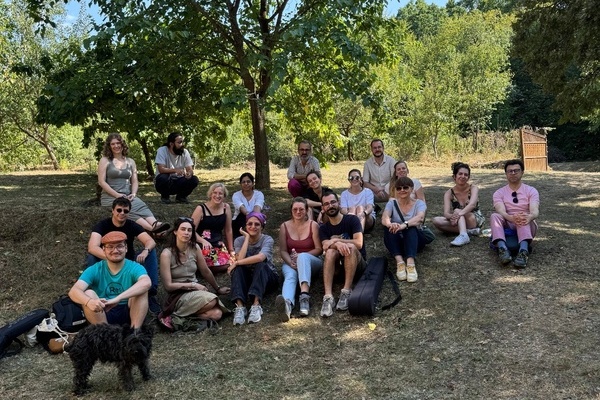
Ethnography and Experience: Report
Report of the workshop “Ethnography and Experience”, August 29 – September 1, 2024; Cluj-Napoca, Romania.
The workshop Ethnography and Experience took place in Cluj-Napoca and Stana, Romania, between August 29th and September 1st, 2024. The aim of the event was threefold: (1) exploring perspectives, theories and methods rooted in phenomenology with a group of PhD students and young scholars, guided by more established researchers; (2) bringing theoretical and analytical questions into a “de-sterilised” environment, where experience and the body could take center-stage, and where participants could ease into depths of conversation and community; (3) promoting phenomenological-anthropological thought and dialogue in Eastern-European academic contexts.
The workshop was opened at the Babeș-Bolyai University by Ewa Klekot’s keynote lecture entitled Anthropology of making as a non-dualistic way of knowing. On experience, empathy, and ethnographic writing, which introduced ways of knowing with the body and set the tone for the entire workshop. The keynote was followed by a short session of getting to know the participants, and Ion Copoeru’s lecture on the intellectual history of phenomenology. After the academic introductions to the theme, the afternoon visit of a wood-working workshop of a local family and the church in Körösfő was meant to provide more bodily experiences as a basis for the discussions that followed in the next days.
The second day was dedicated to the blocks of the PhD and early career presentations, during which we had the opportunity to listen to and discuss the projects of eleven young researchers. The day was closed by Reza Bayat’s evening lecture on borders, trauma and music in the experiences of migrating bodies. On Saturday four lectures guided our discussions. The lectures by Helena Patzer and Áron Bakos were more empirically and fieldwork-oriented in their explorations of questions of bodily knowledge and the pretextual, while Vilmos Katona and Marcela Venebra Muñoz held two more theory-oriented presentations on phenomenology in architecture and anthropological thinking. On the last day of the workshop, before the last discussions and endnote, Soring Gog held the concluding lecture on contemporary spiritual movements and on questions which are hard to grasp within an exclusively phenomenological framework.
The workshop was preceded by a zero day evening lecture, when we listened to Árpád Furu, who analysed some of the aspects of traditional architecture in the region of Kalotaszeg (Călata Region). The informal part of the workshop was concluded with a day that comprised a city walk and two museum visits.
Áron Bakos and Imola Püsök, organisers
Below are impressions some of our lecturers and participants shared for the newsletter:
The workshop "Ethnography and Experience" provided a marvellous opportunity not only to discuss theoretical concepts and methodological approaches, but also to immerse oneself into a learning environment. As the focus of the workshop was embodiment, we as participants were invited to experience and learn through the body - at the wood workshop, in heritage Hungarian villages, in the hilly pastoral landscape, and also by the fire. Most of the workshop took place in a beautiful stone house designed by Károly Kós, an influential Transilvanian architect, artist, and activist living in early 20th century.
The program of the workshop was designed to move us between the academic urban atmosphere of Cluj and the more sensuous rural environment in the hilly plains of Kalotaszeg (Călata Region). The learning environment was perfect, it created an atmosphere of openness and trust, and also provided space for reflection and creativity. The common experience and sharing will no doubt bear fruit in the future academic endeavours of the participants.
Dr. Helena Patzer, lecturer, University of Warsaw
The programme took different perspectives and gave space for spontaneous discussions and explorations. Important advantages of the workshop were meeting and sharing time and activities with inspiring and heart-warming people and the opportunity to immerse myself in the local culture and landscape.
Jacek Wajszczak, PhD student, University of Warsaw
I traveled to Sztána (Stana) to attend a conference near Varjúvár (Crow Castle), a building designed by Károly Kós. It was an event rich in experiences, bringing together lecturers and doctoral students from countries all over the world, from Brazil to India, in this Hungarian-majority village nestled in the forest in Transylvania.
I tied this opportunity to my previous research on architectural phenomenology.
Thanks to the organizers, the event wasn't just an intellectual marathon, but a celebration of life and community, filled with meaningful exchanges, a campfire, and a deep connection to the spirit of the place.
Dr. habil. Katona Vilmos, independent researcher

Photo: Reza Bayat.




